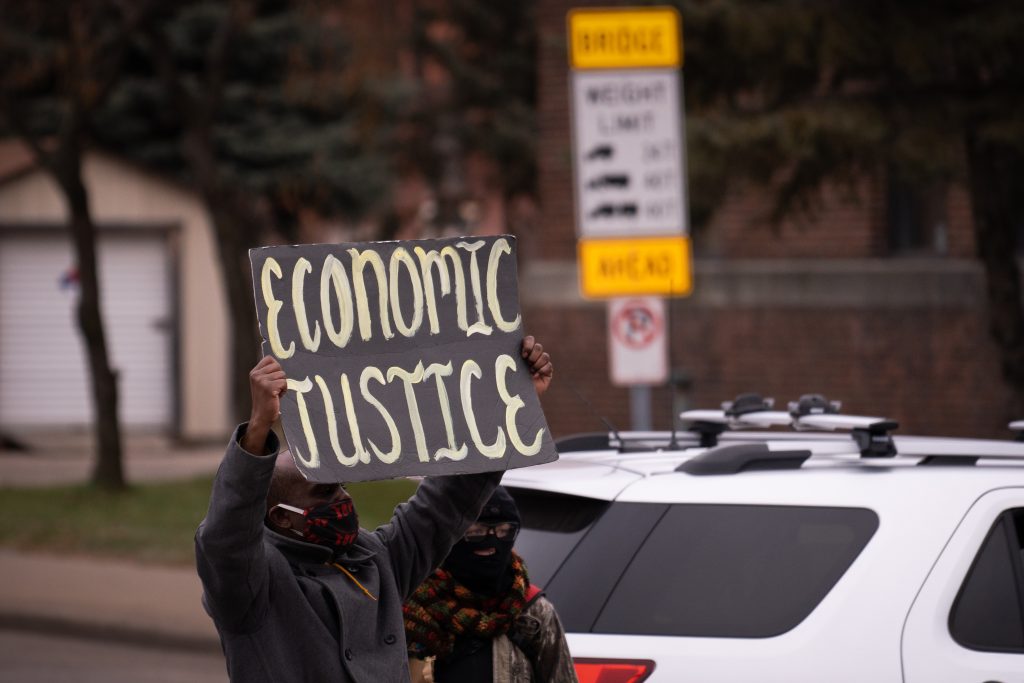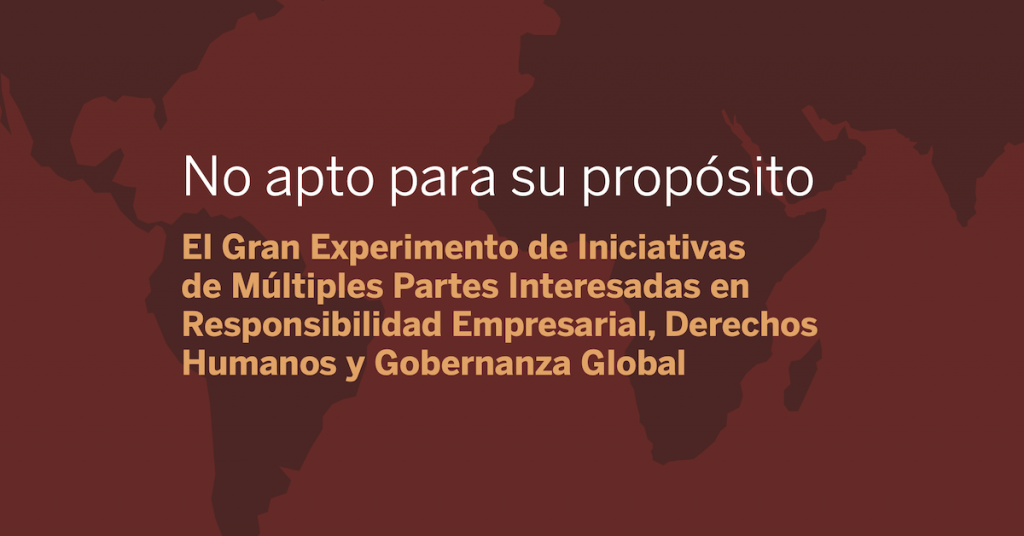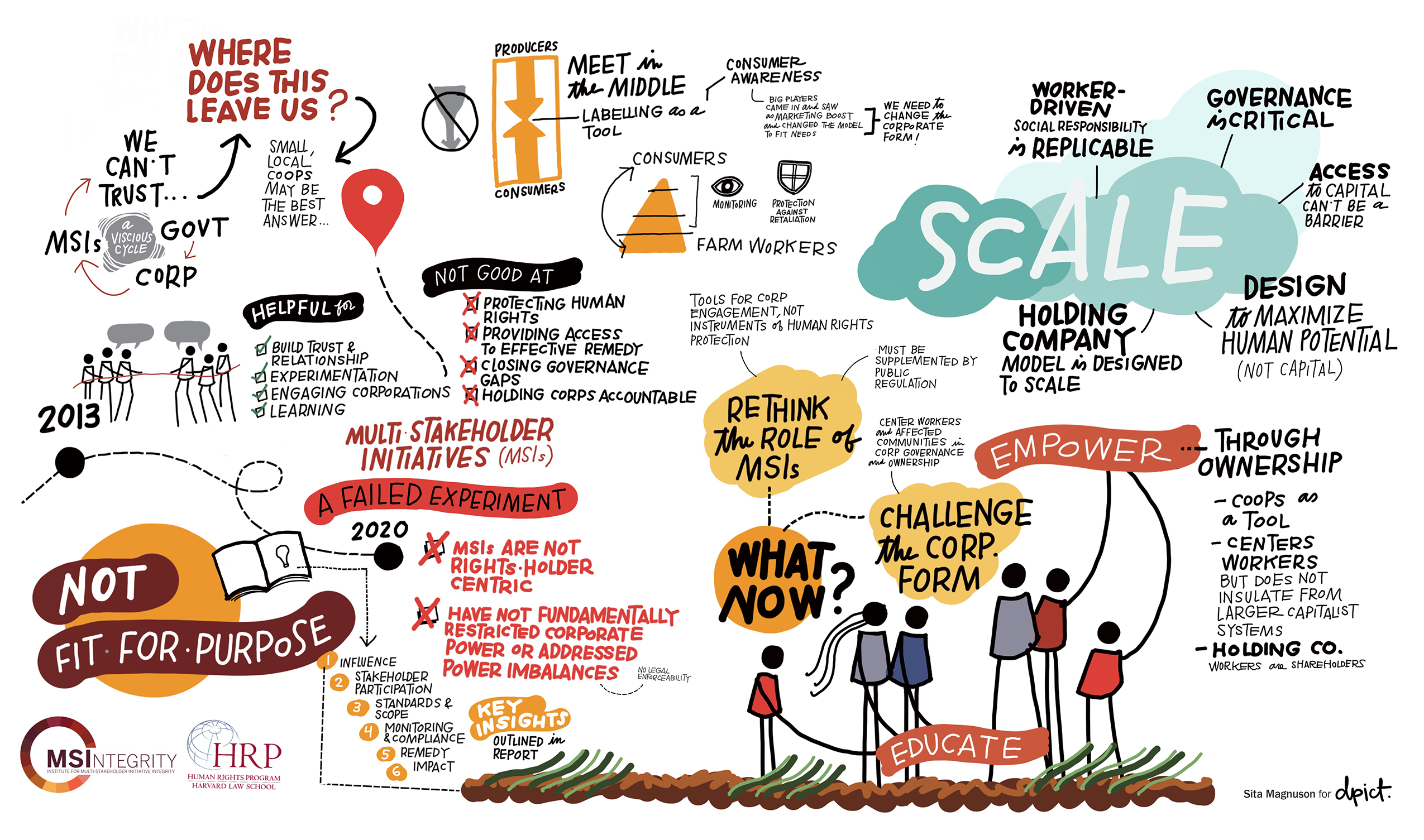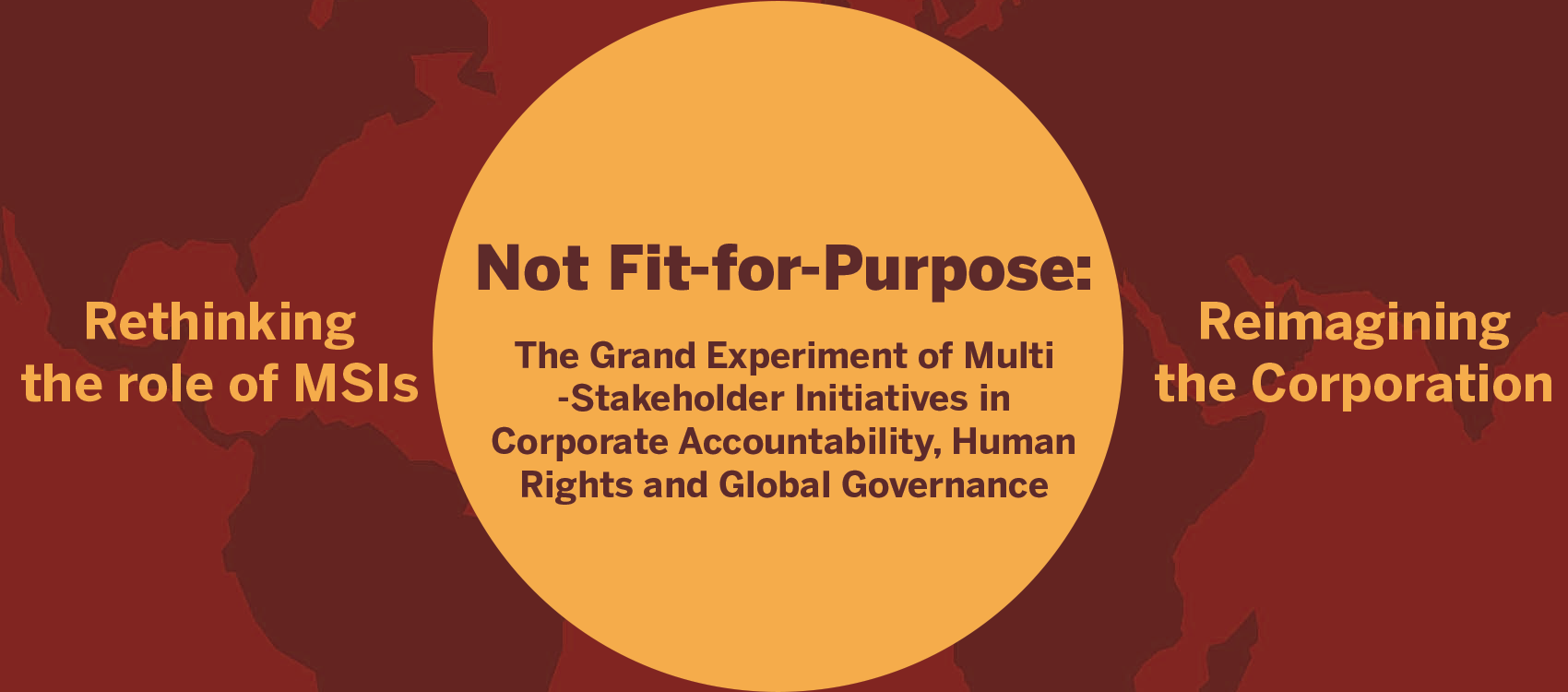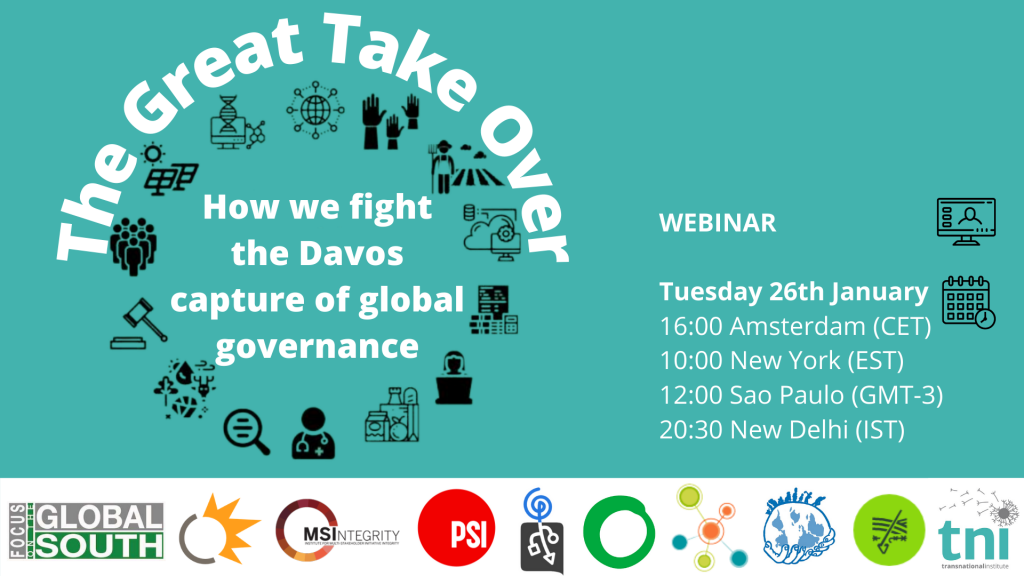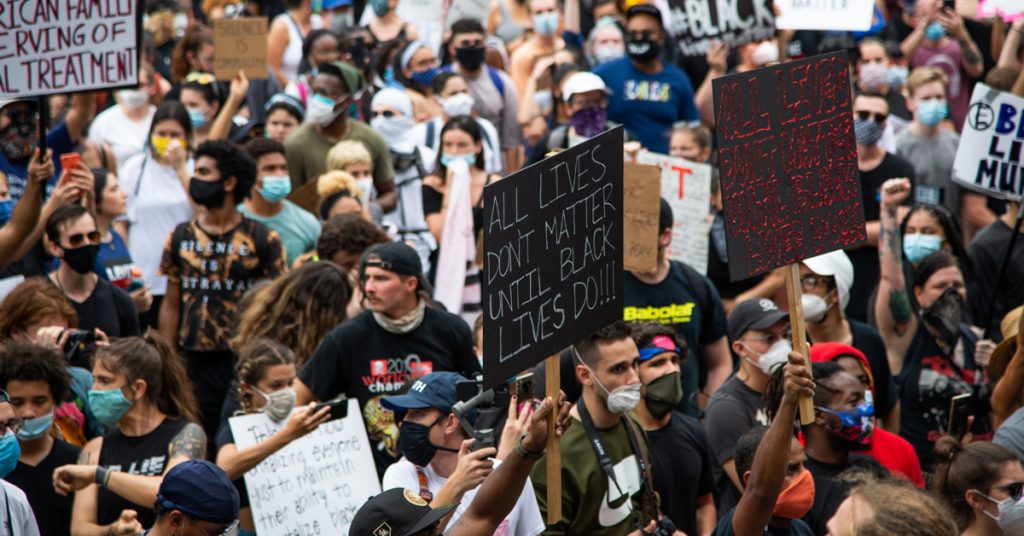In July 2020, MSI Integrity launched the blog series, “Rethinking Multi-Stakeholder Initiatives,” with Harvard Law School’s International Human Rights Clinic (IHRC). Accompanying the publication of MSI Integrity’s major report, Not Fit-For-Purpose, the blog series sought to share several critical perspectives on the MSI field. The contributions largely honed in on two of the key questions posed by the report: are MSIs working for rights holders, and do we need to rethink the role of MSIs as human rights tools?
Beginning with Christie Miedema in her piece, “Binding Brands to Create Change,” and ending with Fola Adeleke’s “Rethinking Corporate Accountability,” the series amounted to nine thoughtful contributions. To close the series, Amelia Evans and Teddy Ostrow of MSI Integrity shared their thoughts on some of those perspectives, as well as what’s next for the organization.
Teddy Ostrow: Amelia, can you recap the purpose of the nine-part blog series, “Rethinking MSIs,” and how it’s relevant to global politics right now?
Amelia Evans: The devastation caused by this global pandemic has pushed many people to a place of discomfort: to confront what many communities and activists have long been saying—that our economic, legal and political systems are failing to protect people and the planet. Debates and discussions have been unfolding in certain quarters about which, if any, of our existing frameworks, tools and strategies have been able to meaningfully address the vast societal inequities that characterize our time, and thus which interventions should accompany us—or might propel us—into a more equitable and just future. While by no means prompted by COVID, as we recognized the failures and limitations of MSIs well before then, this series on “Rethinking MSIs” can be seen as part of those more probing and deep reflections on the adequacies—or rather, inadequacies—of our existing system of rights protections and measures to address corporate power and abuse.
This series—and our report—is also deeply relevant within the specific business and human rights context. First, the single unifying thread of all the voices in this series, consistent with the key finding of Not Fit-for-Purpose, is that voluntarism is inadequate for ensuring the protection of rights. The insufficiency of MSIs underscores the need for efforts underway for binding human rights regulations. These range from the ongoing UN business and human rights treaty negotiations (the sixth session took place as this series unfolded), through to regional, national and local efforts.
Second, there are important implications for the content of such regulation. In particular, some of the contributors in this series point to mandatory human rights due diligence-—which is central to both the treaty and many proposed new national regulations—as the solution. But is it? By itself, this seems unlikely. To begin, the proposed European law has a safe harbour provision that will limit liability if companies implement yet to be determined “recognised (industry) standards”—presumably, this includes the standards set by MSIs. Beyond this circularity, the questions of whether due diligence will ensure actual accountability for abuse—rather than accountability for failing to follow due process—or meaningful access to remedy for communities loom large, as does something much more significant that is raised by this blog series: are reforms enough, or is what we need a transformation of our entire system?
TO: All of the contributions bring up pretty critical points about the MSI field, but I wanted to pick out a few from the series to explore with you further. Let’s start with the contribution from Harris Gleckman, a longstanding expert on MSIs. His contribution, “Where is the Debate About Democracy and Multi-Stakeholder Governance?” outlines a crucial component that he sees as missing in MSIs: democracy. Where is or isn’t “democracy” in MSIs and the debates surrounding them?
AE: In basic terms, if, to you, democracy is merely a system of rules about casting votes, then MSIs have that in spades! All the MSIs in our database are governed either by majority vote or consensus. Many have bylaws or charters that run for dozens of pages, outlining specific rules for membership, voting and other governance matters.
On their face, these rules might seem notionally democractic. But democracy is not just about rules. Its literal translation is “people power.” However, as Jaff Bamenjo points out in the series, MSIs are arguably just “lip service” for communities. The people most directly affected by MSIs-—the workers or communities whose rights are at jeopardy as a result of corporate or government behavior–rarely have a voice in their governance or operation. Only 13% of MSIs have any community or worker representation, and those representatives are not democratically elected or otherwise accountable to the broader constituency of workers or communities. Thus, decisions about the human rights standards, monitoring systems and remedial mechanisms of MSIs—all of which are structures intended to be used or directly benefit rights holders—are made with little, if any, input from rights holders. Sure, many MSIs offer “public consultation” periods that technically allow for community input. But our experience from interviewing almost 120 workers and community members who work or live near companies participating in MSIs from the Philippines, Nigeria and Cameroon, was that these individuals had very little, if any, engagement or familiarity with MSIs that were supposed to protect their rights or offer them access to remedy. They rarely even knew about their rights to file complaints, let alone the websites and forms they would need to access if they wanted to shape standards or request MSI board members take actions that would better protect their rights.
In my conversations with MSI staff, or corporate and government MSI members over the years, many have explained that it is civil society who act as a proxy for community voices. However, not only are most of the organizations that participate in MSIs large international or capital-city-based organizations without direct connection or engagement with communities—think large international NGOs or national research or policy institutes—but few would understand their role as representing communities. Put simply, MSIs are top-down initiatives, not bottom-up democratic institutions.
This is to say nothing of the power imbalances and lack of equality between civil society and corporations, which—as is explained in detail in Not Fit-for-Purpose—the formal rules and processes set by MSIs do little to address. Indeed, many of the rules and processes MSIs have have the perverse effect: putting more burdens on civil society.
TO: Judy Gearhart of the Accountability Research Center wrote about how MSIs have failed to fill governance gaps, one of their key original purposes. As Gearhart explores, how do we “cure the governance gap” and are MSIs a means to that end?
AE: MSIs were formed as a result of the dearth of global, national and even local human rights protections—or the failure to enforce those human rights laws or standards that do exist. Like Judy, and indeed almost all of the contributors to this series, I believe that MSIs have not been able to close those gaps. After a decade of examining dozens of different initiatives, we have amassed a wealth of evidence that MSIs will never be fit-for-purpose to close those gaps.
Why? Because MSIs have not fundamentally restricted corporate power or addressed the power imbalances that drive abuse. Companies have preserved their autonomy and safeguarded their interests throughout the design, governance and implementation of MSIs. The mechanisms most central to rights protection, such as systems for detecting or remediating abuses, have been structurally weak. This has meant that MSIs are capable of achieving positive outcomes where there is genuine commitment on the part of corporate members to change; however, when that goodwill breaks down—as it often has—MSIs have been able to do little to protect human rights.
This doesn’t mean that MSIs cannot play a role in the promotion of human rights, or that they have not had successes. Many participants in MSIs have reported the positive opportunities that MSIs present for learning, relationship-building and experimentation, all of which represent functions that MSIs are well-suited to serve. But as robust rights protection or accountability institutions, MSIs have failed.
TO: Bennett Freeman contributed a piece that draws on his vast experience creating, and working with and in, MSIs. Rather than scrap MSIs all together, he recommends revitalizing them, making them “fitter-for-purpose.” Will MSI Integrity be supporting that notion in its future work?
AE: With intensive external pressure and more resources, might MSIs be capable of incremental improvements? Sure. However, simply and fundamentally, they are not structured to hold companies to account or provide survivors of abuse with access to remedy; they are tools that share power with corporations, rather than restrict or limit that power. Reports of MSIs certifying companies despite their use of child labor, deforestation or poverty wages continue to surface. This is why it is time to recognize their limitations: MSIs are tools for corporate engagement, not corporate accountability.
To us, three decades of experimentation with trying to make MSIs serve accountability or remedial functions is enough. We live in a time of climate emergency, extreme economic inequality and deep racial injustice—all of which have direct links to corporate behavior. There is not enough attention on addressing the root causes of abuse: the incentives and decision-making structures in companies that drive them violate the rights of communities and workers. As we announced when we released this report, we believe it’s time for the human rights community to begin to challenge and change the corporate form itself: to put communities and workers at the center of the governance and ownership of businesses.
TO: One last contribution I want to highlight is a creative one by Tyler Giannini, Director of the IHRC, who we partnered with in the blog series, and Rebecca Tweedie, a Harvard Law Student and former intern at MSI Integrity. They talk about how corporations in MSIs are like foxes in the chicken coop. What are they saying here? And how should we extend the lessons of corporate power in MSIs to other types of multi-stakeholder projects and efforts?
AE: Tyler and Rebecca’s contribution importantly recognizes the extraordinary power differential between corporations and civil society. The premise of MSIs is that they actually share power among different stakeholder groups. But not all stakeholders are equal. Corporations have significantly greater power and resources than civil society and communities, and indeed, many governments. Thus, without a concerted effort to fix this power imbalance, corporate interests have generally won out in MSIs. Rather than insisting on rigorous mechanisms or binding commitments that would help curtail corporate power—such as requiring members to adopt legally enforceable standards, or subjecting members to the authority of a robust and independent grievance mechanism—at each turn in their design, MSIs have adopted approaches that allow corporate interests to prevail. In this context, the regulated target—the company—is left with immense control over efforts to improve its conduct and extensive power to push for compromise in contested areas. This is in counterpoint to the legally enforceable initiatives of the Worker-Driven Social Responsibility Network, such as Milk with Dignity and the Fair Food Program, that are designed by and for workers.
As we move our horizons to challenging and reimagining the corporate form itself, the lessons here are significant. To begin, it is clear from the grand experiment of multi-stakeholderism that voice does not equal power. Thus, adding worker representatives on corporate boards, by itself, may not be the silver bullet, despite the idea’s growing support amongst reform-minded politicians and researchers. The devil will be in the details: do they have majority or veto power? Are they accountable to the wider workplace? Are they sufficiently resourced and empowered? Put another way, the lesson of multi-stakeholderism is that we must meaningfully transfer decision-making power away from dominant corporate interests to workers and communities. If we do not, we risk embedding and perhaps even enlarging corporate power and interests.
TO: How will this blog series inform MSI Integrity’s work going forward?
AE: Well, you are helping to craft those next steps too, and I’ve already thrown out a lot of thoughts. Let’s mix it up: how do you think it is shaping our future work?
TO: If you say so.
Although we’re moving away from the MSI as our primary focus, their influence on debates and actions around human rights and economic inequality are inescapable. The international standard-setting MSIs that our organization studied until this recent shift are important test subjects for the broader expansion of multi-stakeholderism across private and public institutions. Therefore, putting the magnifying glass on MSIs, as this blog series did, is critical to understand how this model impacts rights holders, and what bits and pieces of it we should take, if any, as we pursue alternative means of rights protection and economic and social liberation. The blog contributions tackle both the technical minutiae and the birds-eye view of MSIs. And if we’re going to pursue more equitable models for our economy, we need both. We need vision and we need the details.
I understand this blog series as having a two-pillared meaning for MSI Integrity. First, is that it’s a form of closure for us as we move onto our new direction. And second, it’s also an opening, both for us and the broader business and human rights or corporate accountability communities, to question our assumptions about how we shape our primary economic engines—corporations—and all the institutions that revolve around them. Rethinking MSIs is one way to get that started.
AE: Bingo. There are also important lessons that apply when imagining and promoting alternative business structures. From the importance of transferring power, rather than simply notionally sharing it in ways that simply reinforce existing power imbalances, through to experiences from MSIs about what enables meaningful worker and rights-holder participation, representation and engagement in complex operations or governance arrangements. Understanding how the limits of multi-stakeholderism at an industry-level translate to whether or how multi-stakeholderism should apply at the firm level.
Amelia Evans is the Executive Director and co-founder of MSI Integrity. She is an international human rights lawyer and an Open Society Fellow on Economic Inequality.
Teddy Ostrow is Research and Communications Associate at MSI Integrity and an associate editor at OR Books.
This Q&A closes the joint blog series by the International Human Rights Clinic and MSI Integrity. The series critically examined the role and value of MSIs in business and human rights; it coincided with a new report, Not Fit-For-Purpose, which compiles experience and insights over the last decade and explores cross-cutting trends and lessons learned about MSIs, as a field, from a human rights perspective. Read other blogs in the series here.
